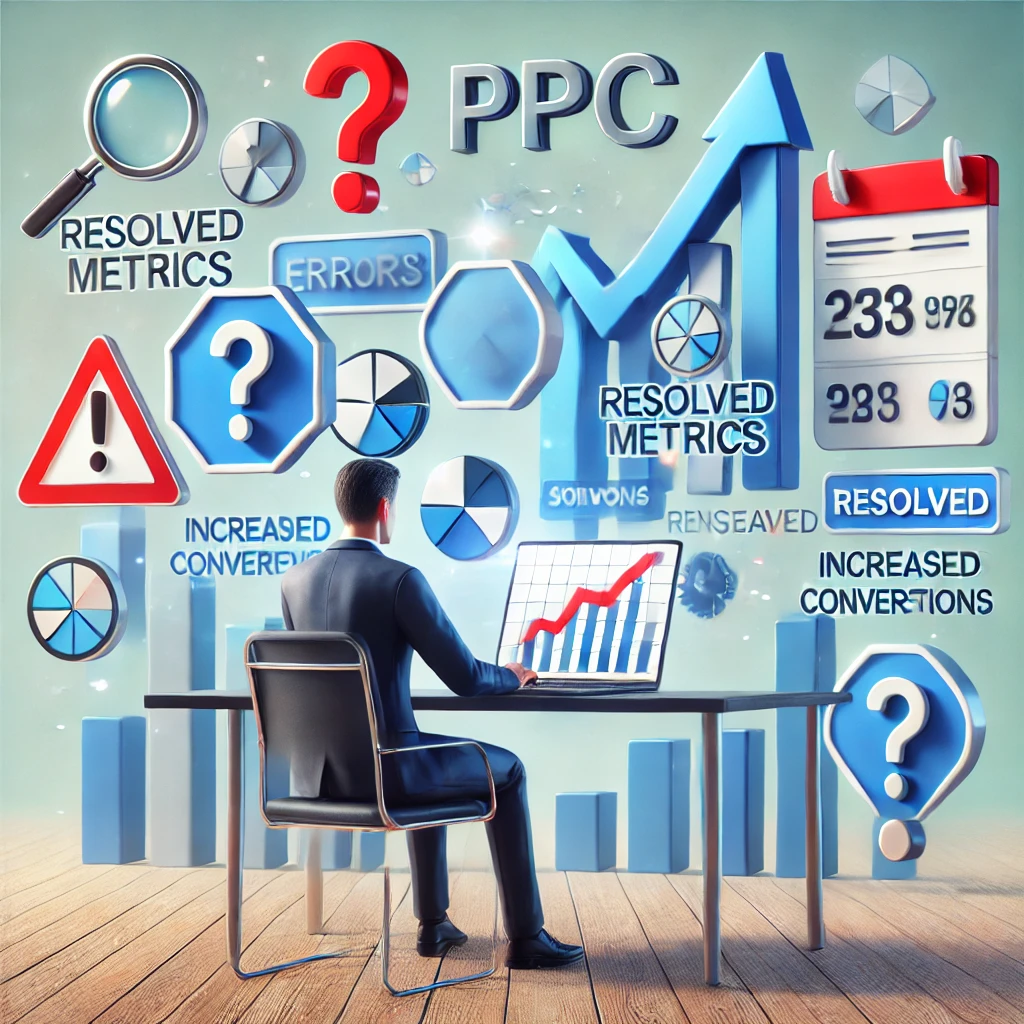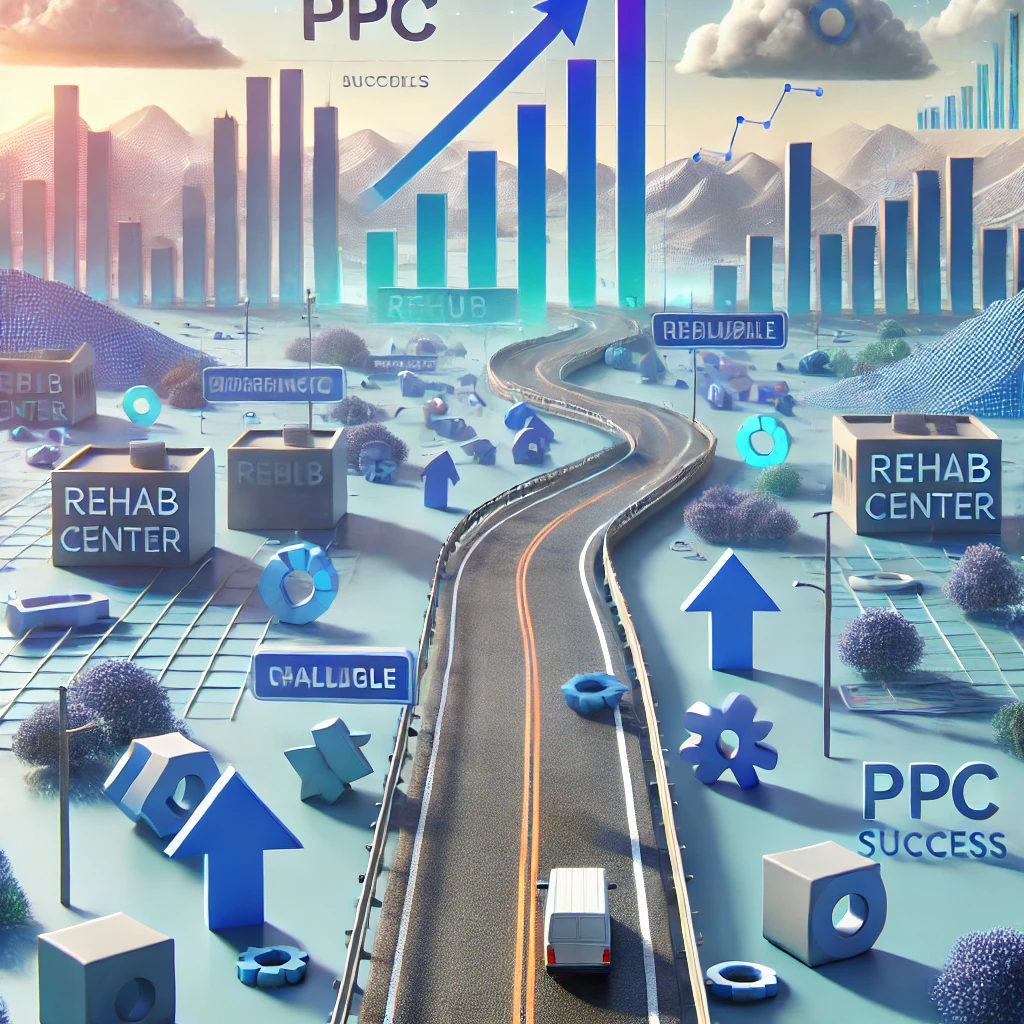
Unlocking the Power of Pay-Per-Click: Relevance for Drug Rehab Centers Explained
Table of Contents
paid search marketing for rehab centers
Understanding Pay-Per-Click (PPC) Advertising for Drug Rehab Centers
PPC advertising is an essential tool for drug rehab centers. It offers a straightforward way to connect with individuals actively seeking addiction treatment. What makes PPC so effective? Unlike traditional advertising, you only pay when someone clicks on your ad, ensuring that your budget goes toward genuine interest. A Google study found that businesses make an average of $2 in revenue for every $1 spent on PPC ads (Google Ads, 2023). This means PPC has a clear and measurable impact on your center’s bottom line, especially in a competitive field like drug rehabilitation.
What is PPC Advertising?
Pay-Per-Click advertising is a digital marketing strategy where advertisers pay a fee each time one of their ads is clicked. It’s like buying visits to your website rather than earning them organically. PPC ads appear at the top of search engine results, making your rehab center more visible to individuals searching for help. These ads are driven by specific keywords such as “drug rehab near me” or “addiction treatment centers.” By bidding on these keywords, your center can reach a targeted audience who is actively seeking your services.
The best part of PPC? It puts you in control. You can set your budget, choose when and where your ads appear, and adjust your strategy based on performance data. According to WordStream, the average conversion rate across all industries for PPC ads is around 3.75%, but healthcare sectors, including rehab centers, often see higher rates due to the urgent nature of the searches (WordStream, 2023).
Why PPC Matters for Drug Rehab Centers
Why should drug rehab centers invest in PPC? Simply put, PPC ads deliver results by targeting individuals who are already seeking help. Unlike broader marketing strategies, PPC directly connects you with potential clients at the moment they need you most. Majority of all high-intent searches result in a click on a PPC ad. This is because PPC campaigns can focus on high-intent keywords, meaning your center’s ads are shown to people who are more likely to convert.
For drug rehab centers, the stakes are high. Every click could potentially represent a life saved. With so much at risk, it’s important to ensure your ads reach the right people at the right time. PPC helps you do just that by enabling you to tailor your campaigns to specific demographics, locations, and even times of day. This level of precision is invaluable in the healthcare sector.
Overview of PPC Platforms: Google Ads, Bing Ads, etc.
Google Ads is the industry leader when it comes to PPC advertising, holding a 91.04% share of the global search engine market (StatCounter, 2024). With Google Ads, drug rehab centers can create highly targeted campaigns that deliver ads to individuals actively searching for addiction treatment. Google’s reach, combined with its advanced tools for keyword research, audience targeting, and performance tracking, makes it the go-to platform for most rehab centers.
But don’t overlook Bing Ads. While Bing holds a smaller share of the search engine market, its 3.86% share still represents millions of users worldwide (StatCounter, 2024). What’s more, Bing Ads often have lower costs-per-click (CPCs), meaning you can get more clicks for your money. For rehab centers with smaller marketing budgets, Bing can be a cost-effective option. Additionally, Bing users tend to skew older and more affluent, which could be a valuable audience for certain addiction treatment programs.
Facebook Ads are another platform to consider, especially for retargeting campaigns. While Facebook isn’t a traditional search engine, its vast user base and advanced audience segmentation tools make it a powerful platform for PPC advertising. Facebook allows you to retarget individuals who have visited your website but haven’t yet converted, giving you a second chance to capture their attention.
The Relevance of PPC Advertising in the Drug Rehab Industry
PPC advertising is not just an option—it’s a necessity for drug rehab centers. It provides a direct way to reach people who are actively searching for help. Unlike other forms of marketing that cast a wide net, PPC targets individuals at the moment they are seeking treatment. This precision is critical. According to a study by Think with Google, 76% of people who search on their smartphones for something nearby visit a business within a day (Google, 2021). For drug rehab centers, PPC ensures your facility is at the top of those search results, offering hope to people when they need it most.
How PPC Increases Patient Leads and Admissions
PPC can drive significant increases in patient leads and admissions. The key lies in the targeted nature of the ads. By bidding on keywords such as “drug rehab near me” or “inpatient addiction treatment,” rehab centers can position themselves directly in front of individuals seeking help. Majority of all high-intent searches result in a click on a paid ad, demonstrating the effectiveness of PPC in capturing potential clients when they are most likely to convert.
But it’s not just about generating clicks; it’s about converting those clicks into actual patient admissions. With the right landing pages and calls to action, rehab centers can guide potential patients seamlessly from a simple search query to enrollment in a treatment program. PPC also allows for A/B testing, where different ad copies and landing pages can be tested to see which versions convert at a higher rate. This data-driven approach ensures that your marketing dollars are spent wisely, maximizing every lead opportunity.
Enhancing Brand Visibility Through PPC for Rehab Centers
PPC doesn’t only drive immediate leads—it enhances long-term brand visibility. When someone repeatedly sees your rehab center’s ad, it builds trust. Even if they don’t click on your ad the first time, the repeated exposure reinforces your brand’s presence in their mind. Over time, this visibility can make your center the go-to option when they or someone they know is ready to seek treatment.
Visibility isn’t just about being seen—it’s about being seen by the right people. With tools like geo-targeting, rehab centers can focus their ads on individuals in specific regions or cities, ensuring that local searchers are more likely to see your facility at the top of their search results. Moreover, platforms like Google Ads allow for demographic targeting, so you can tailor your ads based on age, gender, income level, and more.
Did you know that PPC ads can boost brand awareness by 80%? (Hubspot, 2024). This level of visibility is crucial in a competitive space like addiction treatment, where trust and recognition often play a deciding role in whether a potential patient picks up the phone.
Why Relevance and Timing are Key in PPC Campaigns
Relevance and timing are everything when it comes to PPC advertising for drug rehab centers. A well-placed ad that’s shown at the exact moment someone searches for “best rehab for alcohol addiction” could be the lifeline they’re looking for. The importance of relevance cannot be overstated, as irrelevant ads are more likely to be ignored. Google's quality score system, which assesses the relevance of your ad to the user’s query, directly impacts your ad’s performance and cost. Higher relevance means lower costs-per-click (CPCs) and better ad positioning.
Timing also plays a crucial role. Bidding for ads during peak hours when people are more likely to search for treatment options ensures that your rehab center is in the spotlight when it counts. Moreover, remarketing strategies allow your ads to follow individuals who have already visited your site, gently reminding them of your services over time. This persistent but respectful nudge can lead to conversions down the line.
When it comes to addiction treatment, site retargeting has not been offered by Google or other major retargeting platforms due to strict regulations around advertising in this sensitive industry. These policies aim to protect vulnerable individuals from being targeted inappropriately. As a result, rehab centers face unique challenges in using retargeting strategies, making it crucial to focus on compliant, targeted ads through alternative methods like audience targeting and tailored PPC campaigns to ensure ethical and effective outreach.
Statistics show that 88% of clicks go to the top three paid ads on search engine results pages (SERPs) (Search Engine Land, 2023). This proves that relevance and timing are crucial elements in getting your center in front of the right audience at the right moment. Properly structured PPC campaigns can position your facility exactly where it needs to be when a potential patient is ready to take the first step toward recovery.

Optimizing PPC Campaigns to Maximize ROI for Rehab Centers
Optimizing your PPC campaigns is critical for maximizing return on investment (ROI), especially for drug rehab centers where each click has the potential to change lives. But what separates a mediocre PPC campaign from a highly effective one? The answer lies in the details: crafting high-quality ads, strategic budgeting, and tracking key metrics. When all these elements work together, PPC becomes a powerful tool for driving admissions and increasing patient intake.
Creating High-Quality PPC Ads Focused on Addiction Treatment
Effective PPC ads are not just about grabbing attention—they need to address a real need. For drug rehab centers, the content of your PPC ad must directly relate to the struggles potential patients are facing. Ads should use clear language, focusing on keywords like “addiction treatment” or “drug rehab near me” to ensure they align with what your audience is searching for. Many people who conduct a local search visit a store within five miles. For rehab centers, this means tailoring ads with local relevance is crucial. Include geographic keywords and phrases that resonate with your community.
A compelling call to action (CTA) is also essential. Ads like “Call Now for Immediate Help” or “Find Recovery Today” work well because they inspire action. You’re not just providing information—you’re offering a solution. The combination of empathetic messaging and urgency ensures that potential patients feel understood and motivated to engage.
Furthermore, ad quality score—a metric used by Google to rank the relevance and quality of your ads—plays a huge role in how often your ad is seen and how much you’ll pay for each click. High-quality ads not only improve performance but also lower cost-per-click (CPC). Improving your quality score can lower CPC.
Budgeting and Bidding Strategies for Rehab PPC Campaigns
Smart budgeting is the backbone of successful PPC campaigns. For rehab centers, maximizing ROI means striking a balance between ad spend and lead quality. While it’s tempting to allocate a large budget, you must ensure that each dollar drives valuable traffic. The goal is not just to get clicks but to attract potential patients. By using strategic bidding, you can ensure that your rehab center’s budget is spent wisely.
One effective method is to use automated bidding strategies like “maximize conversions” or “target CPA” (cost-per-acquisition). These strategies allow Google’s algorithms to automatically adjust your bids based on which keywords or times of day are most likely to lead to conversions. Target CPA, for instance, helps rehab centers focus on gaining patients rather than just clicks, ensuring that you’re paying only for valuable actions.
Setting daily budget limits is another way to manage spend effectively. By doing so, you can make sure that your campaign runs consistently throughout the month without exhausting the budget early on. Consider allocating more budget during peak search times—weekends or late evenings—when people are more likely to be researching rehab options. A well-planned budget ensures steady performance and increased ROI.
Tracking ROI: Key Metrics and Performance Indicators
Tracking ROI is where the rubber meets the road in PPC campaigns. Without proper tracking, it’s impossible to know whether your ad spend is delivering results. The most important metrics to monitor include conversion rate, cost-per-conversion, click-through rate (CTR), and lifetime value of each patient. A conversion rate of 5% or higher is considered strong in healthcare PPC campaigns, and rehab centers should aim to meet or exceed this benchmark.
Cost-per-conversion (CPC) is another critical metric. It shows how much you’re spending to acquire a new patient. By optimizing CPC, you can directly measure the effectiveness of your ads. For example, a lower CPC means you’re getting more conversions for your money, thereby maximizing ROI. Google Ads’ built-in tools allow you to track these metrics in real-time, offering valuable insights on which ads are driving the best results.
Finally, it’s essential to calculate the lifetime value (LTV) of each patient. This metric considers the total revenue generated by a patient over the course of their treatment. Knowing this helps determine whether your PPC campaigns are truly profitable. A recent study by HubSpot revealed that businesses with strong LTV strategies grow at least 20% faster (HubSpot, 2022). By continuously optimizing ads and focusing on key performance indicators (KPIs), you ensure that your PPC campaigns generate sustainable, long-term ROI.

Best Practices for Drug Rehab PPC Campaigns
Running a successful PPC campaign for drug rehab centers requires more than just a budget. It demands precision in targeting, an understanding of local markets, and crafting ad copy that truly resonates with people seeking treatment. With healthcare-related PPC, including rehab centers, there’s a human element that can’t be ignored. Research shows that 80% of internet users search for health-related information online (Pew Research Center, 2021). That’s why a strong, well-optimized PPC strategy can make a difference between connecting with someone ready to change their life or losing them to the competition.
Targeting the Right Audience with PPC Ads
Targeting the right audience is the first step in any effective PPC campaign. Without this focus, you risk wasting ad spend on irrelevant clicks. In the rehab industry, this means honing in on the individuals who are actively seeking addiction treatment or their families searching on their behalf. Poperly segmented PPC campaigns can lead to a significant increase in revenue from targeted ads. This highlights how crucial it is to ensure your ads reach the right people.
By focusing on specific demographics, such as age, gender, and interests, rehab centers can customize their campaigns to ensure relevance. But what truly sets PPC campaigns apart? The ability to target by intent. Keywords like “find a rehab center” or “how to recover from opioid addiction” reveal a clear intent to seek help. Targeting these intent-driven searches with appropriate ad copy increases your chances of generating conversions, ensuring that your ad is not just seen but clicked by those who need it most.
Geo-targeting and Local PPC Ads for Rehab Centers
Geo-targeting is one of the most effective tools rehab centers can use to ensure that their ads are shown to the right people in the right locations. Google reports that 46% of searches have local intent, meaning that individuals are looking for services near them (Social Media Today, 2019). For rehab centers, this is particularly important because people often prefer local treatment options, or they may have family nearby who can support them during their recovery.
Using geo-targeting, rehab centers can focus their ad spend on users in specific cities, regions, or even zip codes. If you’re a rehab center in Los Angeles, there’s little point in your ad being shown to someone in New York. Geo-targeting ensures your budget is used efficiently. Additionally, adjusting your bids based on location can maximize visibility in high-demand areas. You might choose to increase your budget for metro areas with higher search volumes while reducing it for regions where competition is lower.
Local PPC ads also allow for hyper-targeted campaigns. For example, you could create different ads for different areas, each with unique messaging that speaks to the needs of that specific region. This localized approach can lead to higher conversion rates because the messaging feels more relevant to the viewer.
Keywords and Ad Copy: Crafting Messages that Resonate
Keywords are the foundation of any PPC campaign, but the ad copy is what seals the deal. For drug rehab centers, the messaging needs to be sensitive yet urgent. People searching for addiction treatment are often in crisis, and the words you choose in your ads can either help them feel understood or drive them away. Emotional ad copy increases conversion rates significantly. This is particularly true in the healthcare sector, where trust and empathy are paramount.
When crafting ad copy, focus on empathy and actionable language. Ads should acknowledge the challenges of addiction while offering a clear path forward. Use keywords such as “get help now” or “start your recovery today” to inspire action. Short, impactful sentences that convey hope and urgency are often the most effective.
Avoid jargon and keep the language simple. Your potential patients or their families are likely feeling overwhelmed, and overly complex wording may deter them from clicking. Instead, keep it direct: “24/7 helpline available,” or “Free consultations to find the right treatment.” Pair these with keywords that people are already searching for, like “drug rehab near me” or “best rehab centers for alcohol addiction.” The key is to ensure that your ad copy resonates deeply, both with those in need of help and those who may be searching on behalf of a loved one.

Case Studies and Success Stories: Effective PPC in Drug Rehab Marketing
Pay-Per-Click advertising has delivered impressive results for drug rehab centers that invest in targeted, well-optimized campaigns. By leveraging the right strategies, rehab facilities have been able to increase patient intake, boost visibility, and ultimately save lives. The success stories from leading rehab centers demonstrate how PPC can transform the way addiction treatment facilities reach their audience. It’s not just about spending money—it’s about spending it wisely and driving meaningful impact.
How Leading Rehab Centers Are Using PPC Successfully
Top rehab centers have seen significant success using PPC to reach potential patients at the exact moment they’re searching for help. For example, one prominent rehab center in California launched a geo-targeted PPC campaign focusing on keywords such as "addiction treatment near me" and "alcohol rehab in California." They carefully tailored their ads to specific zip codes and times of day when searches for addiction treatment services were highest. The result? A 50% increase in patient admissions within six months.
Another success story comes from a Florida-based drug rehab center that used highly relevant landing pages to increase engagement with website visitors. This strategy resulted in boost in conversions.
These examples highlight how effective PPC strategies can drastically improve patient admissions. The key lies in using data-driven approaches like geo-targeting, and high-intent keywords that align with the audience’s needs.
Lessons Learned from Successful PPC Campaigns
What can we learn from these success stories? The most important lesson is the value of relevance. In each case, the rehab centers focused on crafting ads and landing pages that directly spoke to the pain points of their audience. The language was empathetic, clear, and solution-oriented. This emotional connection drove more clicks and, ultimately, more conversions.
Another critical takeaway is the importance of tracking and optimization. Every successful PPC campaign involved constant monitoring of performance metrics like cost-per-click (CPC), conversion rates, and return on ad spend (ROAS). Adjustments were made in real-time to improve results. For example, the Florida rehab center noticed higher engagement on weekends and adjusted their budget to focus more heavily during those times, leading to better ROI. Continual refinement is key to maximizing PPC performance.
Moreover, successful PPC campaigns for rehab centers also emphasize mobile optimization. Since many searches for addiction treatment come from mobile devices, ensuring that ads, landing pages, and calls-to-action are mobile-friendly significantly boosts engagement. Google research shows that 53% of mobile users abandon sites that take longer than three seconds to load (Google, 2021), so speed and accessibility are critical.
Key Takeaways for Applying PPC in Your Rehab Facility
What can your rehab center do to replicate these successes? First, invest in highly relevant, targeted ads. Focus on intent-driven keywords such as “rehab for opioid addiction” or “alcohol treatment center near me” to capture those ready to seek help. Use geo-targeting to limit your budget to areas where you’re most likely to attract local patients. Keep your ad copy simple but impactful, highlighting the benefits of your facility and using strong calls to action like "Call for a Free Consultation" or "Start Your Recovery Today."
Optimizing your landing pages is another essential step. Make sure they’re fast, mobile-friendly, and consistent with your PPC ads. If someone clicks on an ad about alcohol rehab, ensure that the landing page speaks directly to that issue. Consistency between ad copy and landing page content increases trust and improves conversion rates.
Finally, in the addiction treatment industry, site retargeting has not been available through Google or other major platforms due to strict advertising regulations. These rules are in place to protect vulnerable individuals from being targeted inappropriately. As a result, rehab centers face challenges in leveraging traditional retargeting strategies. Instead, they must focus on alternative approaches, such as audience targeting and compliant PPC campaigns, to ethically and effectively reach those in need of treatment.

Conclusion: The Future of PPC Advertising for Drug Rehab Centers
As the digital marketing landscape continues to shift, the role of Pay-Per-Click (PPC) advertising in healthcare, particularly for drug rehab centers, is becoming even more critical. The urgency to connect with potential patients when they need help the most has never been greater. PPC offers an immediate and targeted way to reach those in crisis, ensuring that your rehab center is visible exactly when someone is searching for addiction treatment. But where does the future of PPC lie, and how can drug rehab centers stay ahead of the curve?
The Evolving Landscape of Digital Marketing in Healthcare
Digital marketing in healthcare is rapidly evolving. The focus has shifted from broad, general campaigns to more personalized, data-driven approaches. For drug rehab centers, this means adapting to changes in how potential patients search for and access information. A report by Deloitte suggests that digital transformation in healthcare will only accelerate, especially with the rise of telehealth and online consultations (Deloitte, 2021). PPC is central to this evolution, offering real-time insights that help rehab centers fine-tune their strategies based on audience behavior.
One of the most significant changes on the horizon is the growing role of artificial intelligence (AI) and machine learning (ML) in PPC advertising. These technologies allow for smarter bidding strategies, more personalized ad delivery, and better audience targeting. Google's AI-driven tools like Smart Bidding and Responsive Search Ads have already shown how automation can optimize campaigns by learning from user interactions and adapting in real-time. For drug rehab centers, these advancements mean more efficient use of ad budgets and better targeting of high-intent individuals seeking treatment.
But digital marketing is not just about technology. The need for human connection in healthcare remains paramount. While AI can help optimize campaigns, the messaging still needs to be emotionally resonant. Rehab centers should continue focusing on empathetic, supportive ad copy that speaks to the heart of those in need.
Final Thoughts on the Relevance of PPC for Addiction Treatment Facilities
PPC remains one of the most relevant and effective digital marketing strategies for addiction treatment facilities. Its ability to target individuals who are actively searching for help makes it an invaluable tool in increasing patient intake and saving lives. According to a study by WordStream, healthcare businesses, including rehab centers, see an average conversion rate of 3.75% through PPC ads—one of the highest among all industries (WordStream, 2024). This statistic highlights just how impactful PPC can be when applied correctly.
For rehab centers, the key to maximizing PPC lies in understanding the delicate balance between automation and human empathy. Automating processes like bidding and targeting can increase efficiency, but it’s the carefully crafted, emotionally resonant ad copy that converts clicks into admissions. Words matter, especially when reaching out to people in vulnerable situations.
The future of PPC for drug rehab centers also involves constant adaptation. As digital platforms continue to evolve, so should the strategies. Whether it’s leveraging AI for smarter bidding or adjusting ad copy based on shifting patient needs, rehab centers must stay agile to maintain relevance. New channels, such as voice search and video PPC, are also gaining traction, offering even more ways to reach potential patients. Rehab facilities that are willing to invest in and continuously optimize their PPC campaigns will see the greatest returns, both in patient admissions and overall ROI.
Questions You Might Ponder
How do I determine the right budget for a PPC campaign targeting drug rehab patients?
When setting a PPC budget, consider your target audience size, average cost-per-click (CPC), and expected conversion rates. It's essential to monitor performance and adjust the budget as needed. Tools like Google Ads’ keyword planner can provide cost estimates based on keywords relevant to your rehab center. Start with a manageable budget, track your return on investment (ROI), and scale up as you see effective results. Continuous optimization helps maximize your investment.
What role does ad copy play in converting clicks to admissions?
Ad copy plays a critical role in converting PPC clicks into actual admissions. It must be clear, empathetic, and directly address the patient’s needs. Highlighting the benefits of your facility, such as personalized care, free consultations, or immediate support, increases the likelihood of conversion. Additionally, calls to action like “Get Help Now” or “Talk to a Specialist Today” drive urgency and engagement. Testing different versions of your ad copy through A/B testing can optimize conversion rates.
What are the benefits of using multiple PPC platforms (Google Ads, Bing, Facebook)?
Using multiple PPC platforms expands your reach and ensures that your ads target different audience segments. Google Ads dominates search, but Bing offers a lower cost-per-click and may reach an older, more affluent audience. Facebook Ads provide effective retargeting, reminding potential patients of your services after visiting your site. Combining platforms allows you to tailor messaging for different audiences while leveraging the strengths of each platform to maximize exposure and ROI.
How can a drug rehab center ensure its PPC campaigns remain cost-effective?
To keep PPC campaigns cost-effective, focus on high-intent keywords that align with your audience's needs. Implement geo-targeting to avoid wasting ad spend on irrelevant regions. Use automated bidding strategies like “Target CPA” to optimize for conversions rather than just clicks. Regularly monitor and adjust your campaign performance based on key metrics such as conversion rate and cost-per-conversion. Small adjustments, like pausing underperforming ads or reallocating budget, can significantly impact your ROI.
What impact does artificial intelligence (AI) have on PPC campaigns for rehab centers?
AI enhances PPC campaigns by optimizing bids, improving ad relevance, and predicting user behavior. AI-powered tools like Google’s Smart Bidding adjust bids in real-time to maximize conversions within your target budget. Additionally, AI helps create responsive ads that dynamically adjust based on user preferences and interactions. For rehab centers, this means more personalized and timely ad delivery, ensuring your message reaches those who need help at the most crucial moments.
Are you leveraging the full power of PPC to drive patient admissions? Improve your PPC strategy to deliver life-changing results today.